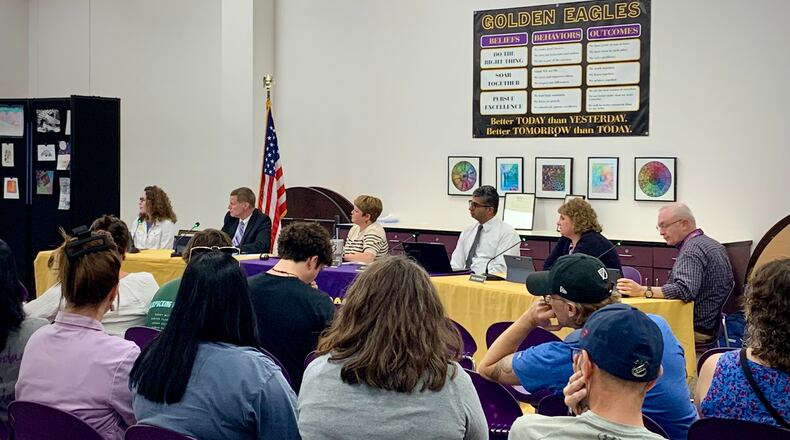Librarians are responsible for reviewing the significant number of library books, Superintendent Doug Cozad said at a school board meeting Thursday, and the library would reopen in a matter of “days and weeks.”
“It’s going to take a little time to start on that process,” he said. “It would be really difficult to tell this person to do that and then supervise students while you’re trying to review those materials.”
High school teachers’ classroom libraries are also subject to the same criteria. A copy of a 10th grade English class syllabus obtained by the Dayton Daily News says that students will be responsible for getting independent reading materials from either the public library or a bookstore instead, and teachers will not be giving personal recommendations.
Board members said they were unaware that the library would be closed.
“I am really quite troubled by that,” said board member Kevin Price, adding that parents have been notified that the process of identifying offending material is already taking place.
“I think it should open tomorrow,” he said. “And there should be a continuing process to review these books.”
Board member Audra Dorn said it’s not just about books, but establishing organization and systems for librarians to send notifications to parents who don’t opt-in to their child’s library access.
“The high school has a very different task than the middle school does,” Dorn said. “I personally don’t take exception to administrators making choices on how to use their staff’s time.”
Per the policy, parents may provide written consent ahead of time for their kids to access these materials, and students whose parents choose not to opt-in to the materials will be given “alternative instruction of equal academic weight,” the policy says.
Parents’ can either give their child “carte-blanche” access to all library books, or if the high school student wants to check out the book, the librarian will contact the parents ahead of time.
More than 75% of parents have already signed off on giving their children full library access, administrators said Thursday.
Some parents and residents who spoke at the meeting said that with books and librarians less accessible, kids will turn to the internet.
“It’s every author’s dream to be on a banned book list, because that’s an instant bestseller,” said Bellbrook parent Jenna Boles. “What we’re doing is driving children to look for this type of content in an un-safer place, like online.”
Other residents said that these issues have come up because the school board went beyond what Ohio law prescribes, by in part expanding the definition of classroom materials to include books in school libraries.
“None of us knew the library would be closed on the first day of school,” said parent Andee Wiesman. “We didn’t wait until today to complain about it. We came here because we were shocked. You said you wouldn’t ban the books; you were right, you didn’t. You just closed the library.”
Sexual content is defined in the policy as any “inherently private sexual acts or sexual intercourse in any form.”
A good litmus test is “if you could do it on a park bench and not be arrested for it...that’s not ‘inherently private.’” Dorn said.
The only exceptions are elective Psychology, AP Psychology, Sociology, and College Credit Plus courses, which inherently reference topics of gender identity in the material.
No books are being removed from the library, but will be segregated in some fashion, school officials said.
About the Author


